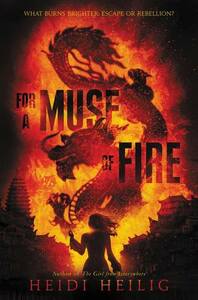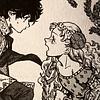Take a photo of a barcode or cover
The writing in this is probably better than the 3-star rating but the audio narration is *TERRIBLE*. There are musical moments, all done in vibrato, that grate on the ears and all the francophone words are pronounced in a distinctly American-not-bothering accent - an odd choice for a book about South East Asian mythology clashing with French colonialism. Also the breathy nature of any moment that was even remotely dramatic enhanced the eye roll factor. It’s a major disappointment and killed my enjoyment of what seemed like a very cool premise. If I continue in the series, it’ll be in print.
Full review to come.
"Never show, never tell."
Things I Liked:
✑ The use of different storytelling mediums
✑ #ownvoices Bipolar Representation
✑ A unique and diverse fantasy world that draws inspiration from the French colonization of Colombia and Vietnam
✑ The MC comes from a family of shadow players!
Things I Liked... Less:
✑ The worldbuilding was bit hard to grasp at times
✑ Some of the plot points were confusingly executed or explained
✑ The use of various ephemera (such as play scripts, stage directions, poetry, etc) seemed to be randomly placed and often broke the flow of the story
---------------------------------------------
Novels & Waffles Blog・Twitter・Instagram・Bloglovin'
"Never show, never tell."
Things I Liked:
✑ The use of different storytelling mediums
✑ #ownvoices Bipolar Representation
✑ A unique and diverse fantasy world that draws inspiration from the French colonization of Colombia and Vietnam
✑ The MC comes from a family of shadow players!
Things I Liked... Less:
✑ The worldbuilding was bit hard to grasp at times
✑ Some of the plot points were confusingly executed or explained
✑ The use of various ephemera (such as play scripts, stage directions, poetry, etc) seemed to be randomly placed and often broke the flow of the story
---------------------------------------------
Novels & Waffles Blog・Twitter・Instagram・Bloglovin'
This book slipped through the cracks for me in terms of reviewing, but wow wow wow. Heilig plays with different forms and narrative voices, and unlike a lot of revolutions in YA, this one comes across as convincingly full of mess and blunders and good intentions gone horribly wrong. Can't wait for the sequels!
Disclaimer: I received a free copy via Edelweiss for review purposes.
Jetta is a member of a famed troupe of shadow players, where a story is told through the shadows cast by puppets. But Jetta and her parents have a secret to their success – Jetta's has necromancy powers and uses it to bind souls to her puppets so they can move without strings. With her skills and their fame, Jetta and her family are trying to make their way from Aquitan and Chakrana (the former inspired by South East Asia, and the latter by France, their interaction and history based on French colonialism), fleeing the rising rebellion, but also where rumor has it the Mad King has a spring to cure his ills, because the spirits of the dead are not the only thing that plagues Jetta. But as the rebellion lands on her front step, Jetta finds herself facing truths and decisions she never imagined.
I am a massive fan of Heidi Heilig's duology THE GIRL FROM EVERYWHERE, and so I was ecstatic to get my hands on an e-ARC of FOR A MUSE OF FIRE. It did not disappoint - not in the slightest. It's an Asian inspired fantasy with a vibrant and dynamic cast of characters, fantastic world-building, a unique magic system (NECROMANCY!), and such lush writing.
The characters – both the main and the secondary – were complex and well-developed and the group dynamics and interactions were exceptional. I adored Jetta, how intelligent, caring, and kind she was. Jetta's malheur is also very much inspired by the author's #ownvoices experience with bipolar. I adored Leo. I adored the feeling of found family, and I also adored the slow burn romance between Jetta and Leo.
Another thing that makes this book so unique, aside from the exceptional world-building and unique magic system, was that whilst most of it was written in the first-person narrative from Jetta's POV, there were letters and transcripts and folklore stories and it enhanced the reading experience and made it feel so immersive. Even though FOR A MUSE OF FIRE is a fantasy, it is very much based on history, with themes of colonialism. I do think that fans of both fantasy and historical fantasy/fiction will find a lot to love here.
FOR A MUSE OF FIRE is a book that I will be recommending to fantasy fans for a long time to come.
Jetta is a member of a famed troupe of shadow players, where a story is told through the shadows cast by puppets. But Jetta and her parents have a secret to their success – Jetta's has necromancy powers and uses it to bind souls to her puppets so they can move without strings. With her skills and their fame, Jetta and her family are trying to make their way from Aquitan and Chakrana (the former inspired by South East Asia, and the latter by France, their interaction and history based on French colonialism), fleeing the rising rebellion, but also where rumor has it the Mad King has a spring to cure his ills, because the spirits of the dead are not the only thing that plagues Jetta. But as the rebellion lands on her front step, Jetta finds herself facing truths and decisions she never imagined.
I am a massive fan of Heidi Heilig's duology THE GIRL FROM EVERYWHERE, and so I was ecstatic to get my hands on an e-ARC of FOR A MUSE OF FIRE. It did not disappoint - not in the slightest. It's an Asian inspired fantasy with a vibrant and dynamic cast of characters, fantastic world-building, a unique magic system (NECROMANCY!), and such lush writing.
The characters – both the main and the secondary – were complex and well-developed and the group dynamics and interactions were exceptional. I adored Jetta, how intelligent, caring, and kind she was. Jetta's malheur is also very much inspired by the author's #ownvoices experience with bipolar. I adored Leo. I adored the feeling of found family, and I also adored the slow burn romance between Jetta and Leo.
Another thing that makes this book so unique, aside from the exceptional world-building and unique magic system, was that whilst most of it was written in the first-person narrative from Jetta's POV, there were letters and transcripts and folklore stories and it enhanced the reading experience and made it feel so immersive. Even though FOR A MUSE OF FIRE is a fantasy, it is very much based on history, with themes of colonialism. I do think that fans of both fantasy and historical fantasy/fiction will find a lot to love here.
FOR A MUSE OF FIRE is a book that I will be recommending to fantasy fans for a long time to come.
“To the mad ones”
I knew I was going to like this book right from the dedication.
For a Muse of Fire is the first book in a YA trilogy set in a high fantasy world inspired by Southeast Asia during French colonization. It's the story of Jetta, a girl with bipolar disorder who is trying to get to a "magic" spring whose waters should be able to help her (because of the lithium which naturally occurs there).
It means a lot to me when I find SFF in which the main character is mentally ill. For two reasons: mental illness representation is only common in contemporary novels, but as I do not live in the US, they do not reflect my experience of living in a country in which there's very little (or: even less) awareness on these topics. The other reasons is that I like seeing mentally ill people being heroes in all genres.
I loved the representation of Jetta's bipolar disorder. It's subtler than I thought it was going to be: Jetta's lows are basically shown as a time jumps in the story. I think variety in representation of mental illness - books that do not show depressive episodes to avoid being too triggering and books that explicitly engage with the topics of depression or suicide - is really important, especially when it's ownvoices like this book.
"Subtle", of course, doesn't mean the representation wasn't there: Jetta's "malheur" is relevant to the plot and to her characterization.
I really liked following Jetta and her family through Chakrana as they try to figure out how to live in a place where the tension between colonizers and the rebellion is rising. I especially liked reading about shadow plays and the way this aspect was tied to the magic system.
The magic system itself was really interesting and imaginative: in For a Muse of Fire, you'll find necromancy in a way you've never seen it before.
Another thing that made this book stand out was the mixed media format: some of the chapters are told like plays, there's sheet music, there are maps, letters and telegrams.
Until now, I talked about what made For a Muse of Fire stand out. However, it didn't stand out as much as I hoped it would. While the themes are very different from the average YA fantasy, I found the plot very formulaic. There are people in power, there's a rebellion, at the beginning of the novel the main character thinks the people in power are not that bad, but then she changes her minds and falls in love with a boy in the process.
Formulaic diverse stories are important - and the diversity here wasn't just a dressing to make the story feel new without any actual depth to it, it isn't tokenism - but sometimes I wonder whether I've read too much YA fantasy. I predicted every single twist from the beginning.
It didn't help that the romance was very bland. There wasn't anything wrong with Leo, the love interest, he was just so forgettable that I had to look up his name, and I finished this yesterday. He doesn't stand out from a sea of very similar YA fantasy love interests.
The dancers at Le Perl - especially Cheeky, I want to know more about her - were far more interesting characters. This is also the only YA novel I know that has positive sex worker representation.
This book definitely could have been better in terms of predictability, but I didn't think it was just average: it's one of the books that executed this kind of plot better.
For a Muse of Fire is set in a colonized country, and the author shows the ways colonization affects a culture through the details - clothing, language, religion, even buildings - without any infodumps. I'm often disappointed by the worldbuilding in YA fantasy books, but I wasn't here.
The writing was solid, but I can't say it stood out. I love atmospheric books, and I would have loved if this had been one of them - I wanted to feel as if I was there with Jetta, but I couldn't always visualize how things looked.
I always say that books longer than 500 pages are longer than they need to be and usually have pacing problems. Here, this was true only for the ending, in which I felt like too much and not enough was happening at the same time. Anyway, the pacing was very good for most of it - I finished this 512-page book in less than three days.
One more thing: some parts of this book hint Jetta is also into girls, and I definitely read her as bi/pan. I didn't know whether to recommend For a Muse of Fire as a queer book, but the author mentioned Jetta is queer in a tweet, so it's canon.
(full review here)
when for a muse of fire was announced i was beside myself with excitement, and so happy for heilig that she got to write write this book. i follow her on twitter, and i've seen her talk about her mental health many times, and how scary it was to put this book out in the world. it's not said on page - probably because the characters didn't have the word - but our protagonist, jetta, clearly shares heilig's bipolar disorder.
i listened to the audiobook, which is narrated by emily woo zeller. while i do feel like i missed some small parts - which was entirely my fault and had nothing to do with heilig or zeller, i just zone out sometimes and forget to listen lmao - i adored it. zeller did an amazing job narrating, and because of how the story is told she sings a capella at a few points. her voice is beautiful and it was a delight to listen to. i also don't want us to forget the fact that this is a book inspired by asian cultures, by an asian writer, read by an asian narrator. the fact that they didn't drop the ball and got a white narrator makes me so happy.
hands down my favourite part of this book was the characters. they are all so layered and interesting, with their own motives and thoughts and beliefs. jetta is hot headed and impulsive, but loves fiercely and will do anything to ensure the safety of her family. she also goes through a depressed episode, followed by a manic one, a little ways into the book. as i previously mentioned, this isn't flat out said with those words, but it is what happens. we need more main characters with mental illnesses written by people with those same illnesses, so that it gets done right and with care.
when for a muse of fire was announced i was beside myself with excitement, and so happy for heilig that she got to write write this book. i follow her on twitter, and i've seen her talk about her mental health many times, and how scary it was to put this book out in the world. it's not said on page - probably because the characters didn't have the word - but our protagonist, jetta, clearly shares heilig's bipolar disorder.
i listened to the audiobook, which is narrated by emily woo zeller. while i do feel like i missed some small parts - which was entirely my fault and had nothing to do with heilig or zeller, i just zone out sometimes and forget to listen lmao - i adored it. zeller did an amazing job narrating, and because of how the story is told she sings a capella at a few points. her voice is beautiful and it was a delight to listen to. i also don't want us to forget the fact that this is a book inspired by asian cultures, by an asian writer, read by an asian narrator. the fact that they didn't drop the ball and got a white narrator makes me so happy.
hands down my favourite part of this book was the characters. they are all so layered and interesting, with their own motives and thoughts and beliefs. jetta is hot headed and impulsive, but loves fiercely and will do anything to ensure the safety of her family. she also goes through a depressed episode, followed by a manic one, a little ways into the book. as i previously mentioned, this isn't flat out said with those words, but it is what happens. we need more main characters with mental illnesses written by people with those same illnesses, so that it gets done right and with care.
This was a slow start for me - which sounds a little weird because the action pretty much starts on page 1, but it took a bit to get invested. There were also a lot of characters who got brief introductions because they weren't fully important until later and some of them had really similar names or were related, so it was occasionally hard to keep track of who was who. But by the second half, I was totally invested and had a hard time putting it down. I loved the main characters, I loved the added narrative elements - telegrams, songs, letters - and the plot was non-stop action. There were hints at romance, but not a lot, for those needing a break from romance. There's just a lot to love here and I'm v angry I'll have to wait a full year for book two.






